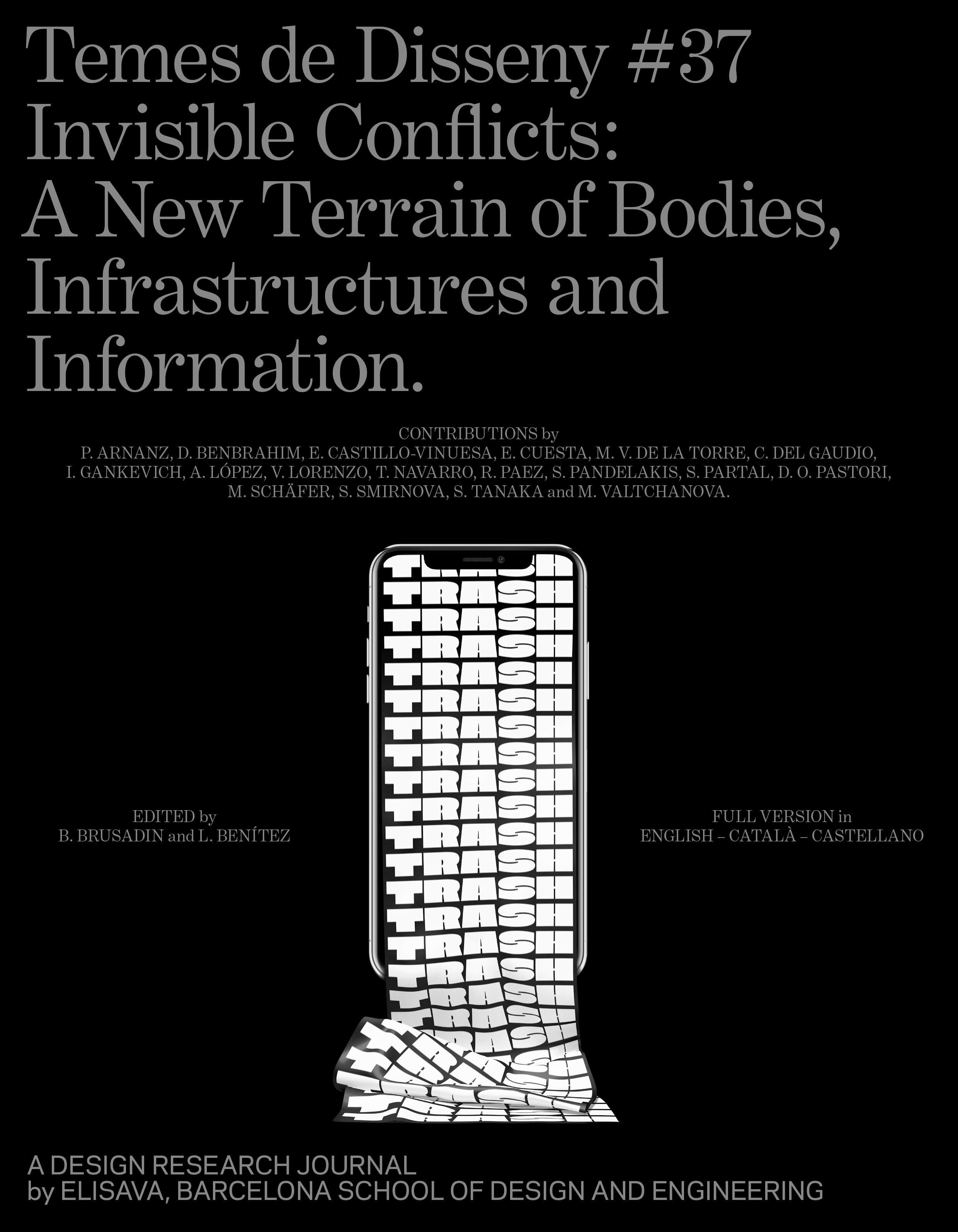The Digital Sublime: Orientation Strategies for a Vertiginous World
Article Sidebar

Main Article Content
This article addresses the increasing levels of complexity and abstraction that digital technologies produce, which generate a feeling of amazement nowadays similar to what the philosophy of art and aesthetics deemed the experience of the sublime. Through the idea of the “digital sublime”, we aim to find ways to find direction in this vertiginous world. Our intention is to research the extent to which art and design can function as mediators of scales that translate the digital sublime into concrete images that are more digestible, as well as easy to understand and perceive. We believe this is one of the challenges that these disciplines must face in our era governed by extra-human scales, both technological (the cloud, artificial intelligence, 5G, etc.) and geological (the Anthropocene and global climate change). With this in mind, we will analyse the work of several artists whose careers reflect their commitment to these issues.
If we, and our bodies, are constantly translated into data, can art and design reverse meaning and make our data transform into bodies in such a way as to produce an aesthetic (sensible) experience of them? Can this help us to understand digital infrastructure and its materiality in a more intuitive and approachable way so that a body can imagine and/or visualise it? Can these actions encourage the production of collective emancipation strategies that allow us to be active agents when reconfiguring the governance and algorithmic regulations imposed on us?
Article Details

This work is licensed under a Creative Commons Attribution-NonCommercial-NoDerivatives 4.0 International License.
(c) Authors, 2021
Alejandra López Gabrielidis, Universitat Oberta de Catalunya (UOC); Elisava, Barcelona School of Design and Engineering (UVic-UCC)
Philosopher specialised in art and digital technologies. Currently a professor at ELISAVA (Barcelona School of Design and Engineering) and ESDi (Advanced School of Design) and a researcher at the Sociotechnical Conceptualisation Vector coordinated by Tecnopolítica (IN3/UOC) at Canódromo, the Digital and Democratic Innovation Athenaeum. She recently translated the book Phenomenology of the End. Sensitivity and Connective Mutation by Franco “Bifo” Berardi for Caja Negra and has published articles and essays in various magazines and with publishers such as Holobionte, BRAC, InterARTive, Teknokultura, Arquine and El Salto.
Toni Navarro, EINA, Centre Universitari de Disseny i Art de Barcelona (UAB)
Philosopher specialised in gender and technology. Currently a visiting professor at EINA, University School of Design and Art (UAB) and a researcher at the Sociotechnical Conceptualisation Vector coordinated by Tecnopolítica (IN3/UOC) at Canódromo, the Digital and Democratic Innovation Athenaeum. He recently wrote the prefaces for the books Xenofeminism by Helen Hester (Black Box 2018) and The War of Desire and Technology at the Close of the Mechanical Age by Sandy Stone (Holobionte Ediciones 2020). He has also translated texts by various authors for the anthology Ciberfeminismo. De VNS Matrix a Laboria Cuboniks (Holobionte Ediciones 2019).
Cuboniks, Laboria. 2018. “Xenofeminismo. Una política por la alienación”. In Aceleracionismo. Estrategias para una transición hacia el postcapitalismo, compiled by Armen Avanessian and Mauro Reis. Buenos Aires: Caja Negra.
Jameson, Fredric. 1991. “Lo sublime histérico”. In Ensayos sobre el posmodernismo. Buenos Aires: Imago Mundi.
Jameson, Fredric. 2016. “La lógica cultural del capitalismo tardío” In Teoría de la posmodernidad. Madrid: Trotta.
Metahaven. 2012. “Captives of the Cloud: Part II.” E-flux Journal 38. https://www.e-flux.com/journal/38/61219/captives-of-the-cloud-part-ii/
Moll, Joana. 2016. “DEFOOOOOOOOOOOOOOOOOOOOOREST.” Janavirgin. http://www.janavirgin.com/CO2/DEFOOOOOOOOOOOOOOOOOOOOOREST_about.html
Santamaría, Mario. 2019. Non-published interview by Alejandra López. Barcelona.
Simondon, Gilbert. 2015. La individuación a la luz de las nociones de forma e información. Buenos Aires: Cactus.
Srnicek, Nick. 2013a. “Accelerationism: Epistemic, Economic, Political”. In Speculative Aesthetics, edited by Robin Mackay, James Trafford and Luke Pendrell. Londres: Urbanomic.
Srnicek, Nick. 2013b. “Representing complexity: the material construction of world politics.” PhD diss., London School of Economics.
Srnicek, Nick, and Alex Williams. 2017. Inventar el futuro. Postcapitalismo y un mundo sin trabajo. Barcelona: Malpaso.
Stiegler, Bernard. n.d. “Hypermatière”. Ars Industrialis. http://arsindustrialis.org/vocabulaire-hypermatiere
Toscano, Alberto, and Jeffrey Kinkle. 2015. Cartographies of the Absolute. Winchester: Zero Books.
Wallerstein, Immanuel. 1974. The Modern World System. New York: Academic Press.
Williams, Alex. 2013. “The Politics of Abstraction”. In Speculative Aesthetics, edited by Robin Mackay, James Trafford and Luke Pendrell. Londres: Urbanomic.